Articles
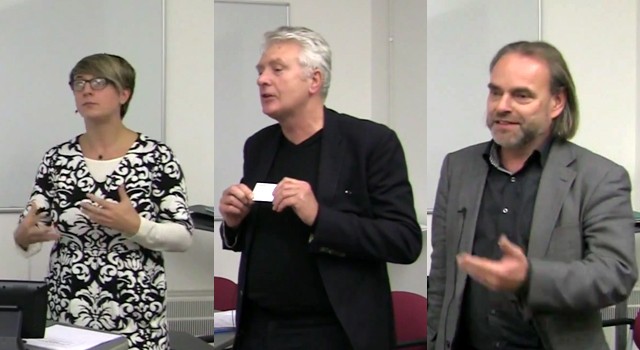
No Comments
By Voices
On 18, Jan 2016 | No Comments | In Community Activity | By Voices
Study Day: Whose War? Whose Memory?
19 November 2015, University of Birmingham
As part of Voices of War & Peace WW1 Engagement Centre’s outreach activities, this study day explored ‘Teaching the First World War in International Perspective’. This Voices event was organised together with the Institute for German Studies, DOMUS, the University of Northampton, and the Georg Eckert Institute for International Textbook Research.
Speakers included: Dr Catriona Pennell (University of Exeter); Peter Glasgow (Peace Pledge Union), and; Professor Eckhardt Fuchs, Dr Barbara Christophe and Dr. Kerstin Schwedes (TU Braunschweig).
See the videos on the Voices YouTube channel.
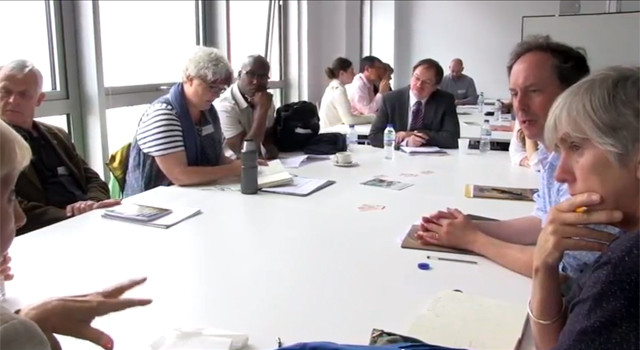
No Comments
By Voices
On 23, Oct 2015 | No Comments | In Community Activity | By Voices
Study Day: Making sense of Community Engagement in and with History and Heritage Based Research
22 June 2015, Birmingham City University
As part of Voices of War & Peace WW1 Engagement Centre’s outreach activities, this discussion event explored the legacy of the First World War and working with academics and the Heritage Lottery Fund.
Part of the Arts & Humanities Research Council’s Connected Communities Festival, the day brought together Heritage Lottery Funded projects (completed and live) for conversation.
See the videos on the Voices YouTube channel.
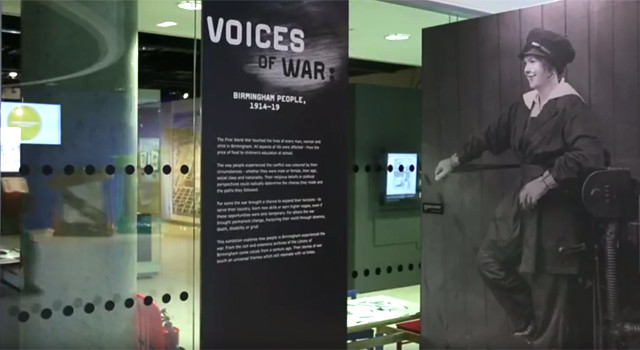
No Comments
By Voices
On 07, Oct 2015 | No Comments | In Community Activity | By Voices
Exhibition: Voices of War: Birmingham People, 1914-19
29 September 2014 – 4 January 2015, Library of Birmingham
The Voices of War exhibition showed how the First World War was experienced by people in Birmingham, drawing on the rich archive, photography and special collections of the Library of Birmingham.
Focusing on the stories of local men, women and children, the exhibition explored a number of themes including the experiences of men at the Front, the war’s impact on children and families, the contribution of black and Asian soldiers, the role of women on the Home Front, Birmingham’s industrial support for the war effort, and debates around patriotism and pacifism in the city.
Book to accompany the exhibition
Great War Britain: Birmingham Remembering 1914-18 by Dr Sian Roberts
See images of the exhibition on the Voices Youtube channel.
Filmed by Abhinay Khoparz
Sound by Sam Coley
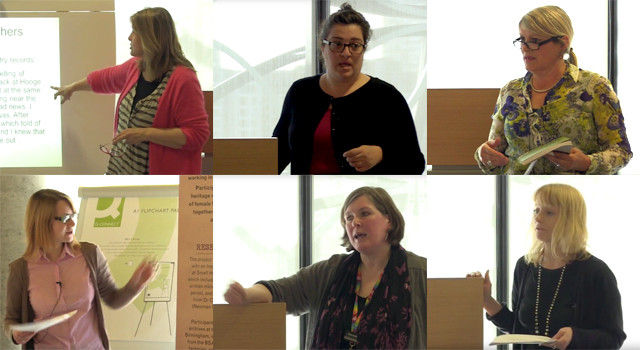
No Comments
By Voices
On 07, Oct 2015 | No Comments | In Community Activity | By Voices
Study Day: Women and the Great War
11 April 2015, Library of Birmingham
As part of Voices of War & Peace WW1 Engagement Centre’s outreach activities, this study day explored women and the Great War.
Speakers included; Professor Maggie Andrews (University of Worcester) ‘Putting the home back in to the history of the Home Front’; Jo-Ann Curtis (Birmingham Museums Trust) ‘Women and First World War Oral Histories’; Annabel Oxford (Friends of Castle Green) ‘Canary Girls’; Catherine Pitt (Women & Theatre) ‘Stories of the Factory Workers’; Dr Sian Roberts (University of Birmingham) ‘Birmingham Women: Peace and Humanitarian Aid’; Dr Richenda Roberts (University of Birmingham) ‘The Impact of War on Concepts of Feminity Represented in British Visual Culture during the First World War’.
See the videos, filmed by Abhinay Khoparzi, on the Voices YouTube channel.
No Comments
By Voices
On 10, Aug 2015 | No Comments | In Community Activity | By Voices
Women’s Work: Stories of Female Factory Workers in WW1
Rachel Snape, Project Manager, Women & Theatre
Women & Theatre’s latest heritage research project, Women’s Work, explores the lives of the women who worked in the Birmingham Small Arms (BSA) factory in Small Heath during WWI.
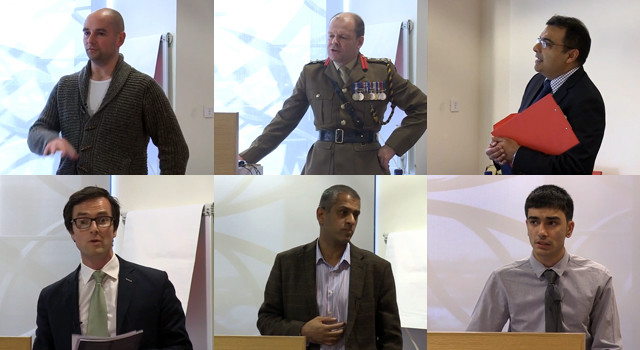
No Comments
By Voices
On 15, May 2015 | No Comments | In Community Activity | By Voices
Study Day: the Asian contribution to the Great War
21 February 2015, Library of Birmingham
As part of Voices of War & Peace WW1 Engagement Centre’s outreach activities, this study day explored the Asian contribution to the Great War.
Prof Ian Grosvenor (Director of Voices of War & Peace) introduced speakers; Michael Noble (Hidden Histories); Colonel Richard Maybery (Deputy Commander for the Army in the West Midlands); Dr Irfan Malik; Stephen Ballinger (British Future); Haroon Ravat (Project Manager; We Also Served) and; Amerdeep Singh Panesar (University of Huddersfield).
See the videos, filmed by Abhinay Khoparzi, on the Voices YouTube channel.
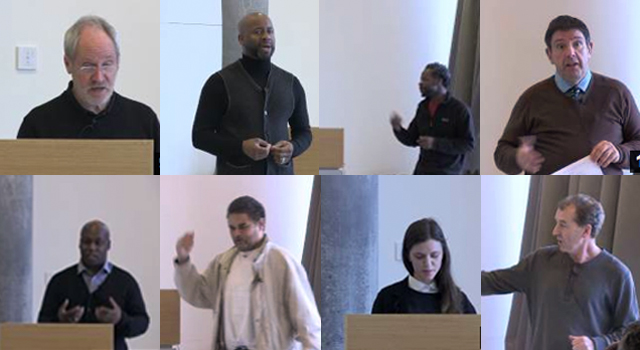
No Comments
By Voices
On 31, Mar 2015 | No Comments | In Community Activity | By Voices
Study Day: Britain’s Black Community and the Great War
31 January 2015, Library of Birmingham
This discussion event was aimed at community groups and individuals who are already involved with, or would like to become part of, projects that focus on the contribution of people from Africa and the Caribbean. Participants shared their work, met others working on projects, and discussed ideas for developing projects and research.
Speakers included: Prof Ian Grosvenor (Director of Voices of War & Peace); Nick Bailey (Aqualung Productions); Garry Stewart (Recognize Black Heritage & Culture); Ian Fellows (on behalf of Walsall African Caribbean Community Association); Ines Elsa Dalal; Horace Barnes (WAW1 Project); Ian Sergeant (The Drum), and; Colin Yates.
See the videos on the Voices YouTube channel.
No Comments
By Voices
On 15, Dec 2014 | No Comments | In Community Activity | By Voices
Workshops: Voices of the First World War: creative writing, conflict and reconciliation
11 October 2014, Library of Birmingham
Local writer Fiona Joseph and poets Garrie Fletcher and Antony Owen led creative writing workshops which used archive material about the First World War to inspire the writing. The event was held in partnership with Writing West Midlands and the Birmingham Literature Festival.
In both of the workshops the participants were able to use archive material held by Birmingham Archives, Heritage & Photography, which was on display in the Library of Birmingham’s exhibition Voices of War. Each of the practitioners was then able to work with the participants to produce poetry, short stories and letters that were inspired by the stories they had been able to explore.
Pieces of creative writing:
Sharon Hosker’s piece was created during Garrie and Antony’s session. The Watchmaker was inspired by the letters of those imprisoned from not wanting to fight. Vice Versa was inspired by the many women who worked at BSA during the First World War.
![[Library of Birmingham: MS 4669/2]](http://www.voicesofwarandpeace.org/wp-content/uploads/2014/12/ms-4669-2-300.jpg) The Watchmaker
The Watchmaker
by Sharon Hosker
I’m a skilled watchmaker
Perhaps there is no need for my trade at present
So I have time on my hands, lots of time, to waste
My toilet schedules are timed to perfection
Once at eight then again at four
With nothing in between
My meagre rations are served precisely
At seven, twelve and six
With nothing in between
Lights out at eight and no bright mornings
Fine in the summer, until winter evenings
Shut in a cell behind a curtain so dark
I don’t know if my eyes are open or closed
Time ticks by
Day after day
Relentless
Nothing changes
Just the sunrise
Or sunset
I’m a skilled watchmaker
Perhaps there is no need for my trade at present
I have two arms and two legs
Am fairly strong, can walk and talk
My enquiring mind picks things up
But I am
Condemned to this routine
Called life
I could labour on a farm, work in a factory
Join the fire brigade, dig holes
Repair homes, drive a truck
Just be of some use
The censored letters from my mother
Tell me my country is still at war
I am prepared to serve my country
Contribute something useful
My beliefs have imprisoned me
To waste my time for over a year
I won’t fight, I won’t kill
I could do so much to help
If only they would listen
My girlfriend wrote in September
‘I can’t love a feller what hasn’t died for his country’
I expect she’s my ex girlfriend now
Shells rushing like sea
Crash in waves
Over broken shores of mud
Bombs impregnated
With salty sweat
And fingerprints
Anonymous ammunition carried
Ever so gently
From weeping machines
Alongside babies
Struggling to feed
Men commanded to fight
By distant authority
Dying to survive
Women have no voice
No choice
But to make
Orphans
And widows
Of our German sisters
Vice Versa
Stephanie Neville’s piece was also created during Garrie and Antony’s session. The poem was inspired by the front cover of the Patriotic Song, Britannia’s Glorious Flag. As Stephanie said, ‘When I looked at it, my eye was immediately drawn to the top corner where there were some musical notes showing this was a piece of music written in a flat key, not what you would usually choose for an upbeat piece of music. Coupled with the stories of those who took a courageously anti-war stance, I wondered whether this could have been a tiny act of resistance, or at least a recognition that all was not joyful and triumphant. More normal for this kind of music would be a major key which lends itself nicely to a play on a double meaning. The other thing that struck me about the propaganda items, including this one, is how we look at them and smile at the naivety in which people were taken in by them. We recognise them for what they are … but somehow cannot apply that same good sense to current military propaganda, and so 100 years on we fall for the same myths, just dressed up in different language and imagery. Hopefully some, or all of that is portrayed in the attached poem’.
![Britannia's Glorious Flag [Library of Birmingham: Music / Song Sheets]](http://www.voicesofwarandpeace.org/wp-content/uploads/2014/12/music-songsheets-britannia.jpg) A (Mainly) Patriotic Song
A (Mainly) Patriotic Song
by Stephanie Neville
Mouths yawning wide
Eyes closed
We sing
Of patriotic duty
And naive hopes of victory
For flag and mother country
But
From somewhere in their midst
This one foresaw
There was a sombre note
And shared his voice
In this the choice
Of a B flat key
Unlocking
Some semblance
Of creativity
Perhaps he saw in his mind’s eye
On these dark lines
Which never meet
Too many
Sharps
Already
Cutting deep in flesh
And painted red
Perhaps he had already heard
What staccato beats
reverberate
Through shattered minds
And resonate
In yearning hearts
Frozen
In a silent fear
That dares no longer sing
And this his song
His only way
To say
He would not dance to the Major’s key
As looking back
With eyes made wise
With knowing smiles
We sagely nod
To this the tune
We say
We would not tap our feet to
And yet
The orchestra plays on
As still we listen
And close our eyes
To the murmur of these lullabies
A gentle drone
We hear as truth
As one white poppy
Still flutters
Unnoticed
In a sprawling sea of red
Kathleen Dixon Donnelly (www.suchfriends.wordpress.com), Jo Toye and Gemma Birch all attended Fiona Joseph’s workshop and were inspired by the exhibition to create the following pieces of work
Voices of War and Peace: The Great War and its legacy
1916
by Kathleen Dixon Donnelly
March 1916: London
Essayist and pacifist Lytton Strachey, soon to turn 36, is called before the Hampstead Tribunal to apply for status as a conscientious objector. He brings a cushion for his tush, explaining to the military men sitting in judgment on him, ‘I am a martyr to the piles…’
When they ask him, ‘If you were to find a German soldier raping your sister, what would you do?,’ Lytton answers, ‘I would try to interpose my own body between them.’
He then gives an impassioned explanation of his stand against the current war, reminding them, ‘I am the society you’re fighting for.’
October 1916: East Sussex
Painter Vanessa Bell, 37, is desperate. She is trying to find any way to keep her lover—Lytton’s cousin and former lover—painter Duncan Grant, just turned 31, out of the war.
The only way for a single man to avoid conscription is to work in service to his country. As a last resort, she finds a local farm, Charleston, which she can rent and live in with her sons. Duncan and their other painter/writer/intellectual/homosexual friends can then ‘work’ the farm.
Oh, and her husband, art critic Clive Bell, 34. He can help, too.
February 1916: Birmingham
‘Never mind if you feel a prig or if you look a fool before the rest of the world. Those living in 2016 will be the best judges of whether you did right or wrong at this time.’
–Gerald Lloyd, 30, conscientious objector
And we will…
THE HOME FRONT/WOMEN ‘The Telegram’
by Jo Toye
Boots. That’s what I remember – the sound of his boots up the entry.
Not that it was an unusual sound – when you live in a court of eight houses, eleven families, there’s a lot of comings and goings. But it was always quieter on Sundays, especially this early, before the kids were out playing hopscotch or throwing sticks to bring down the icicles from the guttering; before the door of the privy started going, or the few who weren’t drunk or asleep after a hard week’s work went off to chapel. That’s what I was doing, pinning my hair up for chapel, but I stopped with it half hanging down because I knew what those boots meant.
Slowly I took the pins from my mouth. The boots turned into the yard and crossed the cobbles. One, two, three paces… I held my breath. Four, five…Then a rap on the door. I closed my eyes and felt myself sway against the washstand. The knocker was raised and rapped again. I heard feet on stairs, the door tugged open… and then the cry. The cry of my neighbour, Bessie, as she saw the telegraph boy, and his sad eyes, and the envelope with the black cross he was holding out to her.
Not for me. Not this time.
I felt a sudden stinging. When I looked down and uncurled my fingers, I had driven the hairpins right into the palm of my hand.
My Darling Rose
by Gemma Birch
My Darling Rose
A week has passed since I wrote you last although, to my mind, it seems much longer. I received yours of the 8th three days ago but was sent as reserve to the front line shortly after and have only just returned to barracks. I should tell you we have had it a bit rough these last few days – a terrible storm hit on Thursday night which was positively beastly. The lightning lit the night sky, making it clear as day, and the Boche took full advantage. I shan’t say anymore lest I give you cause to worry, just know that I am going on alright. We all have to do our bit.
Just a quick note about your letter. I was most pleased to hear you are keeping well, it bucks me up to know you are not letting this dreadful war get you down. I was most surprised to receive another parcel from you so soon but the contents were gratefully received. The toffees and cigarettes I shared with Wilf – they seemed to raise his spirits while he awaits news of Lottie and the baby. And I must say I had a chuckle to myself when I unwrapped the scarf – I have doubtless been complaining about the weather too much! But it has served its purpose well and on these damp, cold days and freezing nights you, my dear, will be keeping me warm. Your new photograph stands proudly on the shelf next to my bunk, keeping watch over me while I sleep. I will be sure and kiss you goodnight every night I am here, my love.
Please reassure Mother that I received her letter, along with one from Joe and two from Alice. I will reply to them soonest.
Finally, my darling, I must send you the warmest of birthday wishes and many happy returns. Do not worry that I am losing my mind, I am well aware your birthday is still two weeks away, but I cannot be sure when you will receive this letter and I am now less than hopeful that this war will be over and I home in time to celebrate with you. I can scarcely believe that this is the first time since we were fifteen years old that we will be spending your special day apart, and in such circumstances too. But it only makes me more determined to do my part in ensuring this war is over sooner rather than later. I would ask one small favour of you though. On your birthday would you be kind enough to wear that dress you wore the night we first stepped out together? It will do me no end of good to be able to close my eyes and picture you as you looked that night. It will be enough to make me believe I am with you once again.
Well my girl, I know you will think me a sentimental old fool but it is these thoughts of you and of home that keep my spirits up. Each day is the same here – they all dawn grey and gloomy, but I am always glad that they do dawn as each one of them brings this war closer to its end which brings me another step closer to you.
But for now, my love, I will have to say goodnight.
Your ever loving Art.
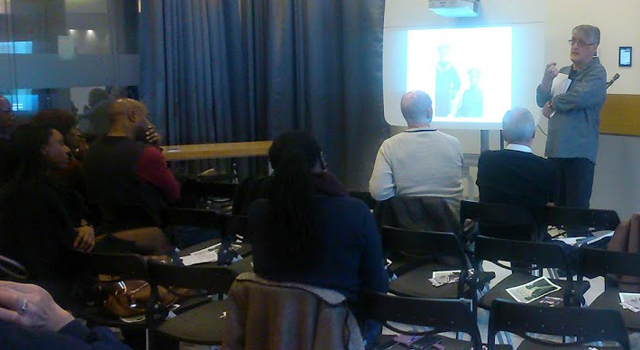
No Comments
By Voices
On 15, Dec 2014 | No Comments | In Community Activity | By Voices
Author Talk: Black Poppies
6 December 2014, Library of Birmingham
A talk and discussion by the author Stephen Bourne to celebrate the publication of his book Black Poppies, Britain’s Black Community and the Great War, published in 2014 by The History Press
We were extremely pleased to welcome Stephen Bourne to the Library of Birmingham to celebrate publication of this important book. Stephen began his talk by telling us about his family background and childhood in Peckham in the 1960s. Stephen’s adopted aunt, Esther, a Black working-class woman, had been born in London in 1912 and their relationship gave Stephen an awareness of the Black presence in Britain long before the arrival of the Empire Windrush at Tilbury Docks in 1948. By 1914 Britain was home to at least 10,000 black Britons, many of African and West Indian heritage. Most of them were loyal to the ‘mother country’ when the First World War broke out. Despite being discouraged from serving in the British Army, men managed to join all branches of the forces, while black communities contributed to the war effort on the home front. By 1918 it is estimated that Britain’s black population had trebled to 30,000, as many black servicemen who had fought for Britain decided to make it their home. Stephen makes great use of historical records and has researched intensively to present us with first-hand accounts of soldiers who fought, but also Black men and women living on the Home Front. Stephen’s talk ended with discussion of the race riots that took place in Liverpool, Cardiff and London in 1919, resulting in the death of at least one Black man, who was forced into the docks in Liverpool and drowned. After the talk the audience discussed various issues that had been raised.
We are grateful to Stephen for coming to Birmingham and we look forward to welcoming him back to a discussion event on Britain’s Black Community in the First World War at the end of January 2015.
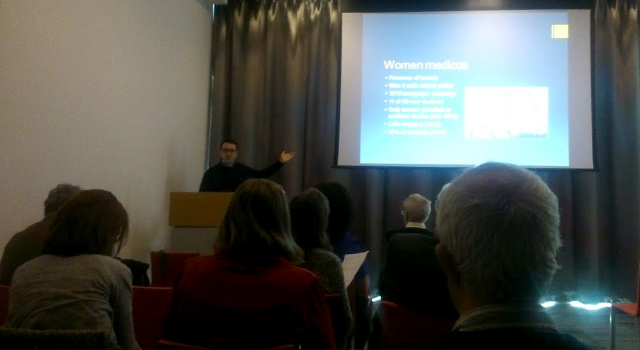
No Comments
By Voices
On 15, Dec 2014 | No Comments | In Community Activity | By Voices
Study Day: First World War and injury, medicine, disability
6 December 2014, Library of Birmingham
This study day was held to consider different aspects of the medical advances and types of injury and disability that occurred as a result of trench warfare during the First World War and also to explore the legacy of the conflict and to offer some comparisons to today.
Speakers from different backgrounds spoke on a wide range of topics. Lt Col Professor Steve Jeffery, a Consultant Burns and Plastic Surgeon at Birmingham’s Queen Elizabeth Hospital and the Royal Centre for Defence Medicine and Professor of Wound Study at Birmingham City University compared surgical wound care from 1914 to the present day while Professor Jonathan Reinarz, Director of the University of Birmingham’s History of Medicine Unit gave a historical perspective on the provision of care in the city just prior to the outbreak of war and described the impact the conflict had on hospitals after the war began. In the second session Ian Fellows spoke about a project that he had been involved with called Blinded by War. The project was organised by Insight Society, a social enterprise that has provided services in Birmingham and the Black Country for blind and visually impaired people since 1998. Blinded by War was one of the first projects to be funded by the Heritage Lottery Fund’s Understanding the First World War programme and was an activity based project designed to improve the participants’ knowledge and research skills and made heavy use of museum collections, most notably that of the Imperial War Museum; Julia Midgley, an artist whose current exhibition ‘War Art and Surgery’ is influenced by the pastel drawings by Henry Tonks of soldiers who had suffered facial injuries and were being treated by the pioneering surgeon Harold Gillies. Julia spoke about the artistic process she employs in her depictions of soldiers injured during combat in Iraq and Afghanistan who are undergoing rehabilitation at Headley Court; Dr Emily Mayhew from Imperial College London ended the morning session with a talk on the creation of specialist stretcher bearers and described their importance in being the first point of contact an injured soldier would have. The last paper in the afternoon was by Professor Nigel Hunt, Associate Professor at the Faculty of Medicine and Health Sciences at the University of Nottingham, who spoke about shellshock in WW1 and beyond.


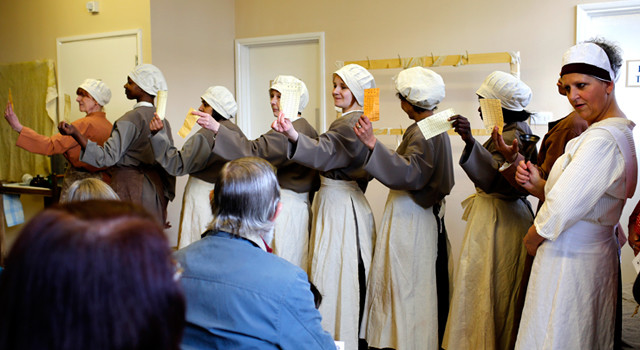
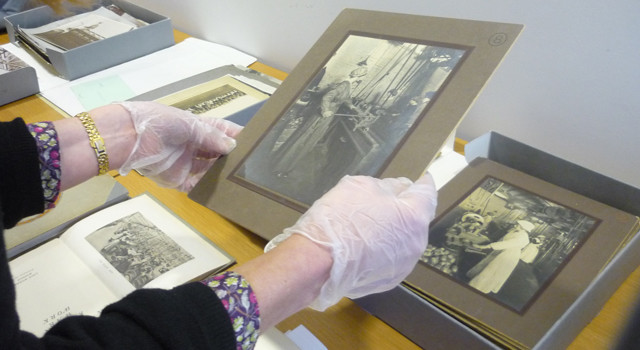
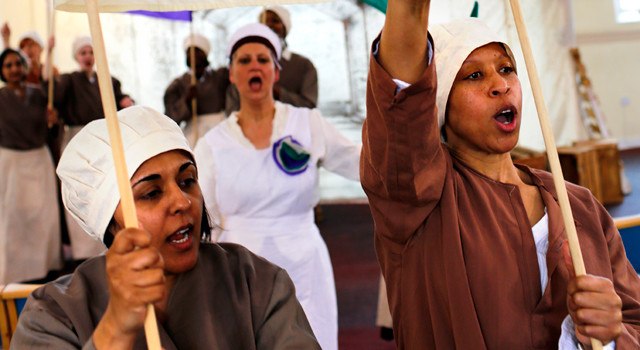
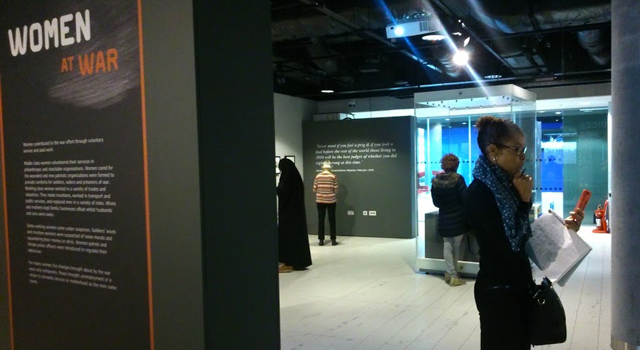
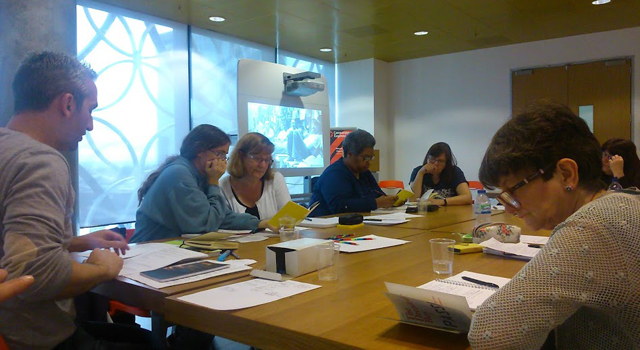
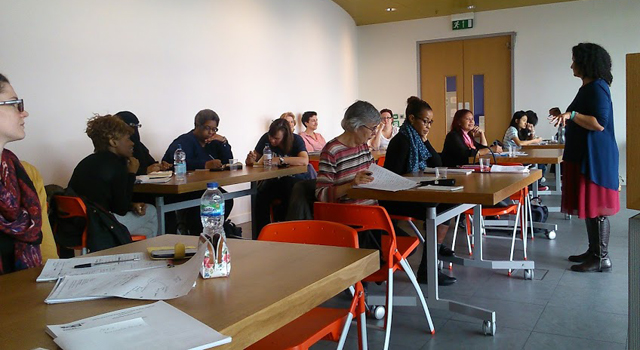
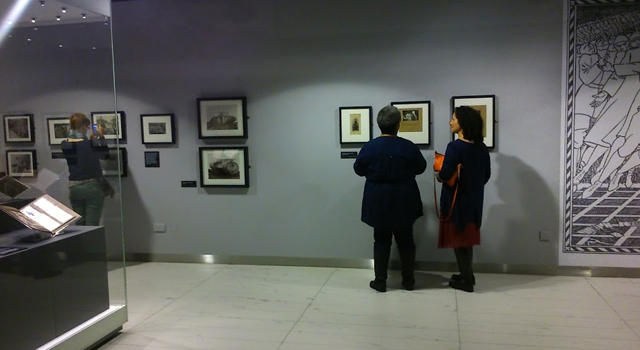
![Munitions Workers [Library of Birmingham: WK/B11/6700]](http://www.voicesofwarandpeace.org/wp-content/uploads/2014/12/wk-b11-6700.jpg)
